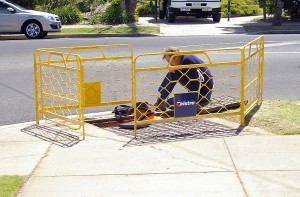
The ACMA's Little Black Book
The Australian Communications and Media Authority, ACMA, is the Government’s media regulating body. They work on a complaints basis, so if content is deemed to be R18+ or to contain excessive amounts of violence, drugs, terrorism etc. then they ban it. They cannot search for new material currently, but instead they review complaints submitted to them (by the public, law enforcement etc.) and then decide whether to ban it or not. This list of banned items is called the ACMA Blacklist.
So why are people so upset about this list? This filtering of content has worked well for movies, why not the internet as well? There are two main areas of thought here:
1) Why is the list black? – The content of the list is not publicly available. In the ACMA’s last report however, 781 overseas sites were added to the list:
- 3 were pedophilia related
- 410 were rated “RC – Child – Depiction”
- 251 were X-rated
- 117 “other” legal content
Previous years showed similar statistics. Wikileaks claims to have the list in full, although of course the ACMA or Senator Conroy would never admit that. This secrecy and the lack of transparency around the reporting process, judgement criteria and the Blacklist itself has people concerned. This was heightened by the leaked Blacklist containing links to popular sites such as YouTube, Geocities and Flickr, as well as plans by Senator Conroy to monitor the blogosphere for dissent.
2) How will it be enforced? – There is enforcement currently in place, Australian websites on the Blacklist can be forcefully taken down. Sites that even link to Blacklisted sites can be fined $11,000, although the irony is that you will never know your link is Blacklisted until it’s too late.
Senator Conroy has decided that the Government needs to be more proactive about this process however, they need to make the filtering mandatory at the ISP level (the company who provides your internet connection). He has setup a live trial with a number of lower tier ISP’s to test his theory, having been rejected by the three big players: Telstra, Optus and Iinet. This opposition is mostly at a technical level, basically arguing that the filter will substantially slow internet access and be largely ineffective (Peer to Peer, Email and other traffic will not be filtered).
Not Happy Jan? You can:
I just hope that they use the inevitably flawed trial as a way out of this sticky web they have weaved. Please try and focus on getting the National Broadband Network right before you cripple our current copper tangle.
 As part of the Heads of Agreement that Telstra has signed with NBNCo, Telstra is being paid $11 billion taxpayer dollars. This amount is effectively the sum value of each and every customer they migrate off copper. As John Stanhope (Telstra CFO) states:
As part of the Heads of Agreement that Telstra has signed with NBNCo, Telstra is being paid $11 billion taxpayer dollars. This amount is effectively the sum value of each and every customer they migrate off copper. As John Stanhope (Telstra CFO) states:

